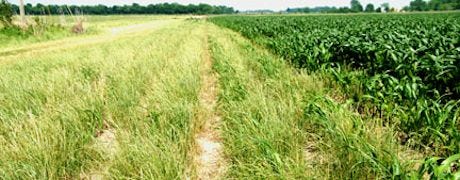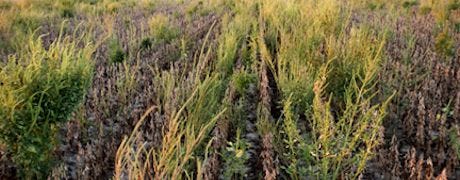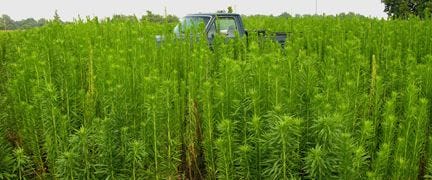
If you've noticed it's getting harder to control waterhemp, marestail, giant ragweed, and a few other weeds in row crops, you have company. Mike Owen, Iowa State University Extension weed specialist, told a meeting of Iowa Soybean Association directors this week that the incidence of glyphosate resistant weeds in Iowa is increasing and it's "…not okay to just continue what you've been doing."
An Iowa Soybean Association funded study of 500 waterhemp populations in the state shows 56% are now glyphosate resistant. Resistant common waterhemp can be found on more than 20% of the row-crop fields in the state. The percentage of fields with at least one resistant species is higher than that.

Glyphosate resistant Italian ryegrass stunts corn in rows on the edge of a Mississippi cornfield.
The problem of increased weed resistance to glyphosate has occurred because of weed management decisions made by farmers
Owen says this problem occurred because of decisions farmers have made and not because of anything special about the weeds or flaws in glyphosate herbicides. Based on these findings, he believes "…action to combat this situation in Iowa should have been taken yesterday."
Tom Eubank, a weed scientist at the Mississippi State University Delta Research and Extension Center, warns against complacency, and says that Iowa's colder climate could be a reason the situation here has not progressed as rapidly as it has in the South.

Glyphosate resistant Palmer amaranth in soybeans ready for harvest.
"Every major row-crop producing county in Mississippi has at least one glyphosate resistant weed species present at some level," he says. So far, eight different glyphosate resistant species have been documented in Mississippi. In a state with 2 million acres of soybeans, 750,000 acres of corn and 500,000 acres of cotton, growers may now use as many as six different applications of herbicides in a calendar year, sometimes at a cost in chemicals alone surpassing $100 an acre.
Horseweed (marestail) was the first weed documented to be resistant glyphosate in Mississippi. That was in 2004. Since then, Italian ryegrass, waterhemp, Palmer amaranth, Johnsongrass, giant ragweed, goosegrass and spiny amaranth have all been added to the list.~~~PAGE_BREAK_HERE~~~
"Some of these weeds are more aggressive and have more impact on crop production than others," Eubank says. "The three types of pigweed we have and Italian ryegrass are probably the most detrimental in terms of crop production here.
"These weeds have literally put some of our growers out of business," he adds. "Some had problems so severe there was nothing left they could do to manage the weeds. Others lost rented land because landowners were unhappy with their inability to keep weeds out of the crops."

Glyphosate resistant horseweed (marestail) nearly hides a full-sized pickup.
Eubank says not all farmers in Mississippi have experienced this yet, but will have soon if they don't take steps now to intensify their weed management programs. For those with a known resistance problem, it's not uncommon to see them use a fall burndown plus a residual herbicide, a spring burndown before planting, another at planting including another residual herbicide, and two or more in-season herbicide applications.
"If you can catch the resistant weeds early enough, paraquat does a good job of controlling them. But once Palmer amaranth gets 6 ft. tall, you can't put on enough paraquat to kill it," he says.
Farmers need to use a number of different modes of action, applying these herbicide at the right time
While Eubank believes glyphosate can still be a part of the weed control program, he says growers need to take advantage of a number of different modes of action, applied at the right time, in order to effectively control resistant weeds and prevent their spread to more acres. "Many of our growers are now using the Liberty Link system as an alternative to glyphosate. One trap we absolutely don't want to fall into is overusing this product and having this technology go the same route as glyphosate," he says.
Thanks to special funding from Bayer CropScience, Eubank will outline his ideas on managing resistant weeds and devising a weed control program to prevent development of resistance for growers who haven't yet experienced it at the annual On-Farm Network® Conference on February 21, in the Scheman Building on the Iowa State University campus in Ames.
About the Author(s)
You May Also Like




